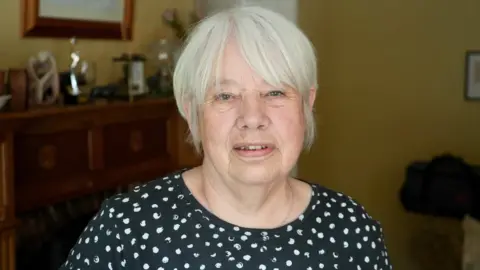Norfolk and Suffolk NHS trust lost track of patient deaths - review
 Heather Coleman
Heather ColemanA mental health trust lost track of figures for patient deaths, a review found.
It said numbers on public documents such as board reports did not match internal figures at the Norfolk and Suffolk NHS Foundation Trust (NSFT).
Of 11,379 deaths of people in contact with the trust over the past five years, the exact number that could have been deemed avoidable was unknown.
The trust insisted most were in the community and not related to poor care.
However, the review found the cause of death had not been established in more than three quarters of those cases.
No confidence
Auditing firm Grant Thornton examined the way NSFT recorded and reported mortality data after campaigners claimed there had been more than 1,000 avoidable deaths at the trust in recent years.
It analysed methods and data from between April 2019 and October 2022 and found:
- Multiple systems used to collate figures, leading to differences in the overall numbers
- Clinical staff with no confidence in the trust's mortality figures
- When figures peaked there was little understanding of why
- Between April 2019 and September 2022, 1,868 deaths had an ethnicity recorded as "not stated" and 1,009 as "not known"
Of deaths since 2018, where were the circumstances were confirmed, 259 were suicides and 271 were investigated as patient safety incidents.
Grant Thornton found the recording of some deaths involved "manual" spreadsheet entries that did not meet the "audit standards" of clinical systems.
The auditors found "more should be done to understand the causes of death and contributing factors".
The review made 16 recommendations to improve data gathering and quality.
Regarding recording suicides and inpatient deaths, Grant Thornton said processes were strong.

Mark Harrison, from the Campaign to Save Mental Health Services in Norfolk and Suffolk, said: "We've been telling the trust for years their data is unreliable.
"Clearly, the scale of the deaths crisis and the deaths problem is greater than we in the campaign thought and told them."

'She was still very high risk'
 Jamie Niblock/BBC
Jamie Niblock/BBCMother of two Ellen Armstrong was 41 when she took her own life in April 2018.
Her mother, Heather Coleman, said her daughter was discharged too early from hospital by NSFT.
"She didn't want to be discharged. We didn't think she should be discharged," said Mrs Coleman. "She was still very high risk."
 Heather Coleman
Heather ColemanEllen had attempted to take her own life earlier in the year but that was not recorded in "any of the paperwork", her mother said.
Five weeks after leaving Northgate Hospital, in Great Yarmouth, Ellen's body was discovered by her father at home in Beccles.
A review highlighted problems with communication and record-keeping.
 Heather Coleman
Heather ColemanStuart Richardson, chief executive officer at NSFT, said: "In recent years, we have made significant improvements to the way we handover between teams and involve people in the planning of their care.
"But we know this is of little comfort to those who have lost loved ones where we could have done more.
"In 2018, we sent our sincere condolences to Heather Coleman on the death of her daughter and we extend our heartfelt sympathies again today".

Overall services provided by NSFT have improved, according to the Care Quality Commission (CQC), which upgraded its rating from "inadequate" to "requires improvement" following an inspection last year.
The report rated the trust as "good" for being caring. This followed years of underperformance, with the trust being the first mental health provider in the country to be placed in special measures in February 2015.

Analysis
By Nikki Fox, BBC East health correspondent
According to the Deputy Chief Executive Cath Byford, this mortality review was established to find a "single truth" regarding the number of deaths from people in the care of mental health services.
Despite months of work, it has not done that.
Bereaved relatives and campaigners have been saying for years the confused data recording and presentation by the trust makes it impossible to learn lessons or to establish the number of people dying because of poor mental health care. They have been proved right.
Rather than providing assurance, the report raises concerns the trust vastly under-reported deaths, that it attributed deaths to Covid when it had no evidence that was the case and it did not analyse deaths or look at trends.
The system is stretched to breaking point but, until the lives behind each number are more accurately understood and recorded, there's no clear sign things can change.

Mr Richardson said "We are very sorry that the trust has not previously had the systems and processes in place for the collection, processing and reporting of mortality data that would be rightly expected from a high performing organisation.
He added: "We are pleased Grant Thornton found strong governance around the recording of all patient safety incident deaths including suicides.
"Data quality, performance reporting, and governance all form vital elements of the improvement work that is well under way across the organisation - which was recognised by the Care Quality Commission with an overall improved rating in February 2023."
Mr Richardson said the trust was now working toward standardised reporting for mortality.

Find BBC News: East of England on Facebook, Instagram and Twitter. If you have a story suggestion email [email protected]
